31 oct 2017
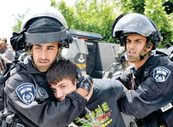
Israeli soldiers invaded, Tuesday, the al-Khader town, south of the northern West Bank city of Bethlehem, and abducted two children.
Mohammad Salah, the coordinator of the Popular Committee against the Annexation Wall and Colonies in al-Khader, said dozens of soldiers invaded the Old City, especially around the schools’ area, and fired many gas bombs and concussion grenades.
The soldiers also abducted two children, identified as Ali Mohammad Issa, 13, and Ramzi Ayman Sobeh, 13, near their homes.
Mohammad Salah, the coordinator of the Popular Committee against the Annexation Wall and Colonies in al-Khader, said dozens of soldiers invaded the Old City, especially around the schools’ area, and fired many gas bombs and concussion grenades.
The soldiers also abducted two children, identified as Ali Mohammad Issa, 13, and Ramzi Ayman Sobeh, 13, near their homes.
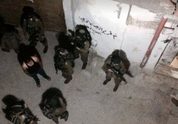
Dozens of soldiers invaded, Tuesday, many Palestinian homes in Ethna and Beit Ummar towns, in the southern West Bank governorate of Hebron, and installed roadblocks on main roads leading to several villages and towns.
Many army vehicles invaded Beit Ummar town, north of Hebron, before the soldiers initiated violent searches of homes, including the home of Ali Ayyad Awad, who was forced along with his family in one room, while the soldiers searched the property, and its surrounding areas.
In Ethna town, west of Hebron, the soldiers invaded and searched homes, in addition to several shops.
Furthermore, the army installed roadblocks at the main entrances of Ethna and ath-Thaheriyya towns, in addition to the al-‘Arroub refugee camp, and Abda Junction south of Hebron, before stopping and searching cars, and interrogated many Palestinians while inspecting their ID cards.
Many army vehicles invaded Beit Ummar town, north of Hebron, before the soldiers initiated violent searches of homes, including the home of Ali Ayyad Awad, who was forced along with his family in one room, while the soldiers searched the property, and its surrounding areas.
In Ethna town, west of Hebron, the soldiers invaded and searched homes, in addition to several shops.
Furthermore, the army installed roadblocks at the main entrances of Ethna and ath-Thaheriyya towns, in addition to the al-‘Arroub refugee camp, and Abda Junction south of Hebron, before stopping and searching cars, and interrogated many Palestinians while inspecting their ID cards.
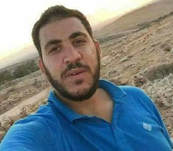
Mohammad Abdullah Mousa 26
Israeli soldiers shot and killed, Tuesday, a Palestinian man from Deir Ballout town, in Salfit governorate, and injured his sister, after the soldiers fired live rounds at his car, near a military roadblock, close to Halamish illegal colony, northwest of Ramallah.
The man, identified as Mohammad Abdullah Mousa, 25, and his sister, Latifah Mousa, 33, were both injured by army fire, but he later died from his serious wounds in Beilinson Israeli Hospital in Petah Tikva.
Mohammad worked odd jobs, while his sister is married, and has four daughters and a son.
Although the army initially claimed the soldiers opened fire at the car after the driver attempted a “vehicular attack” against them, the Israeli District Coordination office later said the soldiers apparently “accidentally fired at the car.”
The army claimed that the soldiers opened fire at the vehicle after it “raised suspicion when it approached the roadblock,” and added that it was investigating the incident.
Mohammad’s sister is currently receiving treatment for gunshot wounds in her shoulder, in the Istishari Hospital, in Ramallah.
Mousa Ballout, one of their cousins said Mohammad didn’t see the military roadblock, and the stop sign leading to it, adding that the soldiers instantly opened fire at the car.
Mousa added that the Palestinian District Coordination Office is talking to the military to arrange the transfer Mohammad’s corpse back to his family.
Mousa also stated that the Mohammad was driving to Ramallah to prepare the needed paperwork for his driver’s license, while his sister accompanied him to check out a school for her daughter. The Palestinian Red Crescent said the soldiers obstructed the work of its ambulance crew, before they later managed to transfer the wounded woman to the hospital in Ramallah.
Talking to Israeli online daily Haaretz, Mohammad’s cousin, Kamal Mousa, said the family strongly rejects the military’s allegations, and described them as lies and fabrication, to justify the shooting.
He added that a person who intends to carry out an attack does not bring a family member, such as a sister or a mother, because he knows he, and those who accompany him, will be seriously hurt, and even killed.
Palestinian killed, sister wounded by Israeli soldiers near Ramallah
The Israeli occupation forces on Tuesday opened fire at two Palestinian siblings near the illegal Israeli settlement of Halamish, northwest of Ramallah, killing the brother and wounding the sister, Palestinian and Israeli reports said.
The Ministry of Health confirmed that Mohammad Abdullah Mousa, 26, was killed in the attack.
His sister was injured and transferred to hospital for urgent treatment.
Spokeswoman for the Palestinian Red Crescent Urrab Fukahaa said the sister was treated for the wounds sustained in the shooting attack, adding that the Israeli forces prevented paramedics from reaching the brother.
The Israeli army claimed the soldiers opened fire at the siblings after they tried to carry out a car ramming attack near a military camp adjacent to Halamish outpost, adding that none of the soldiers were wounded in the alleged attempt.
Israeli soldiers shot and killed, Tuesday, a Palestinian man from Deir Ballout town, in Salfit governorate, and injured his sister, after the soldiers fired live rounds at his car, near a military roadblock, close to Halamish illegal colony, northwest of Ramallah.
The man, identified as Mohammad Abdullah Mousa, 25, and his sister, Latifah Mousa, 33, were both injured by army fire, but he later died from his serious wounds in Beilinson Israeli Hospital in Petah Tikva.
Mohammad worked odd jobs, while his sister is married, and has four daughters and a son.
Although the army initially claimed the soldiers opened fire at the car after the driver attempted a “vehicular attack” against them, the Israeli District Coordination office later said the soldiers apparently “accidentally fired at the car.”
The army claimed that the soldiers opened fire at the vehicle after it “raised suspicion when it approached the roadblock,” and added that it was investigating the incident.
Mohammad’s sister is currently receiving treatment for gunshot wounds in her shoulder, in the Istishari Hospital, in Ramallah.
Mousa Ballout, one of their cousins said Mohammad didn’t see the military roadblock, and the stop sign leading to it, adding that the soldiers instantly opened fire at the car.
Mousa added that the Palestinian District Coordination Office is talking to the military to arrange the transfer Mohammad’s corpse back to his family.
Mousa also stated that the Mohammad was driving to Ramallah to prepare the needed paperwork for his driver’s license, while his sister accompanied him to check out a school for her daughter. The Palestinian Red Crescent said the soldiers obstructed the work of its ambulance crew, before they later managed to transfer the wounded woman to the hospital in Ramallah.
Talking to Israeli online daily Haaretz, Mohammad’s cousin, Kamal Mousa, said the family strongly rejects the military’s allegations, and described them as lies and fabrication, to justify the shooting.
He added that a person who intends to carry out an attack does not bring a family member, such as a sister or a mother, because he knows he, and those who accompany him, will be seriously hurt, and even killed.
Palestinian killed, sister wounded by Israeli soldiers near Ramallah
The Israeli occupation forces on Tuesday opened fire at two Palestinian siblings near the illegal Israeli settlement of Halamish, northwest of Ramallah, killing the brother and wounding the sister, Palestinian and Israeli reports said.
The Ministry of Health confirmed that Mohammad Abdullah Mousa, 26, was killed in the attack.
His sister was injured and transferred to hospital for urgent treatment.
Spokeswoman for the Palestinian Red Crescent Urrab Fukahaa said the sister was treated for the wounds sustained in the shooting attack, adding that the Israeli forces prevented paramedics from reaching the brother.
The Israeli army claimed the soldiers opened fire at the siblings after they tried to carry out a car ramming attack near a military camp adjacent to Halamish outpost, adding that none of the soldiers were wounded in the alleged attempt.
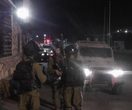
Israeli soldiers abducted, overnight until dawn hours, Tuesday, eleven Palestinians, including a woman, in many parts of occupied East Jerusalem, and took them to several detention and interrogation centers in the city.
Dozens of soldiers, accompanied by many undercover officers, invaded Qalandia refugee camp, north of Jerusalem, abducted three young man, and shot three others with live fire.
Local Red Crescent medics rushed the three wounded Palestinians to Palestine Medical Complex, in Ramallah.
The soldiers also fired gas bombs, concussion grenades and rubber-coated steel bullets, at the local youngsters who hurled stones at them following the invasion.
Many hours after the invasion, the soldiers broke into the homes of the three abducted Palestinians, and violently searched them.
In addition, the soldiers invaded homes in the at-Tour neighborhood, overlooking the Old City, and abducted a woman, identified as Manal Abu Sneina, in addition to Rashid Resheq.
The Palestinian Prisoner’s Society (PPS) has reported that many soldiers invaded al-‘Isawiya town, in the center of Jerusalem, and abducted Mahmoud Mousa Odeh, in addition to Husam Manasra, from Qalandia, Majed Khashan, from Shu’fat refugee camp, and Hussein Kahalaf, from Hizma town, northeast of Jerusalem, after breaking into their homes and searching them.
Dozens of soldiers, accompanied by many undercover officers, invaded Qalandia refugee camp, north of Jerusalem, abducted three young man, and shot three others with live fire.
Local Red Crescent medics rushed the three wounded Palestinians to Palestine Medical Complex, in Ramallah.
The soldiers also fired gas bombs, concussion grenades and rubber-coated steel bullets, at the local youngsters who hurled stones at them following the invasion.
Many hours after the invasion, the soldiers broke into the homes of the three abducted Palestinians, and violently searched them.
In addition, the soldiers invaded homes in the at-Tour neighborhood, overlooking the Old City, and abducted a woman, identified as Manal Abu Sneina, in addition to Rashid Resheq.
The Palestinian Prisoner’s Society (PPS) has reported that many soldiers invaded al-‘Isawiya town, in the center of Jerusalem, and abducted Mahmoud Mousa Odeh, in addition to Husam Manasra, from Qalandia, Majed Khashan, from Shu’fat refugee camp, and Hussein Kahalaf, from Hizma town, northeast of Jerusalem, after breaking into their homes and searching them.
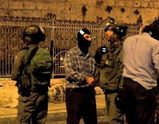
A group of undercover Israeli soldiers invaded, on Monday at night, Qalandia refugee camp, north of occupied East Jerusalem, abducted three young Palestinian men, while regular soldiers injured three others with rubber-coated steel bullets.
Media sources in the refugee camp said the undercover officers infiltrated into it while driving cars with civilian plates, abducted the three young men, and withdrew towards nearby Qalandia terminal.
Regular army units were heavily deployed at the main entrance of the camp to secure the withdrawal of the undercover officers by clashing with youngsters, and fired many rubber-coated steel bullets at them.
Medical sources said three young men were shot with rubber-coated steel bullets; one in the head, and two others in their lower limbs.
Media sources in the refugee camp said the undercover officers infiltrated into it while driving cars with civilian plates, abducted the three young men, and withdrew towards nearby Qalandia terminal.
Regular army units were heavily deployed at the main entrance of the camp to secure the withdrawal of the undercover officers by clashing with youngsters, and fired many rubber-coated steel bullets at them.
Medical sources said three young men were shot with rubber-coated steel bullets; one in the head, and two others in their lower limbs.
30 oct 2017
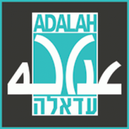
The Israeli military has posted a status on Facebook threatening the home and lives of a Palestinian family in the Gaza Strip.
Adalah – The Legal Center for Arab Minority Rights in Israel and Al Mezan Center for Human Rights (Gaza) have responded, calling on the Israeli military to immediately halt its threats against the family and other civilians in Gaza.
On 10 August 2017, Yoav Mordechai, commander of the Israeli military’s Coordinator of Government Activities in the Territories (COGAT), announced on the unit’s Arabic Facebook page that the military had discovered two tunnels and related infrastructure constructed by Hamas under a mosque and apartment building in the village of Beit Lahiya.
Via Facebook, Mordechai informed Palestinian civilians living in and around the six-story apartment building and mosque in the northern Gaza town that their lives are threatened by a potential Israeli military attack on the area.
Aerial images included in COGAT’s Facebook post show the mosque and apartment building, owned by Omar Hammad, marked in red (see screenshot below).Twenty-one people live in the building, including four women and 12 children.
Adalah – The Legal Center for Arab Minority Rights in Israel and Al Mezan Center for Human Rights (Gaza) have responded, calling on the Israeli military to immediately halt its threats against the family and other civilians in Gaza.
On 10 August 2017, Yoav Mordechai, commander of the Israeli military’s Coordinator of Government Activities in the Territories (COGAT), announced on the unit’s Arabic Facebook page that the military had discovered two tunnels and related infrastructure constructed by Hamas under a mosque and apartment building in the village of Beit Lahiya.
Via Facebook, Mordechai informed Palestinian civilians living in and around the six-story apartment building and mosque in the northern Gaza town that their lives are threatened by a potential Israeli military attack on the area.
Aerial images included in COGAT’s Facebook post show the mosque and apartment building, owned by Omar Hammad, marked in red (see screenshot below).Twenty-one people live in the building, including four women and 12 children.
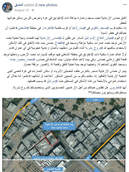
Army repeatedly threatens civilians
On 10 – 11 August, Israeli media outlets published aerial imagery of Hammad’s home supplied by the Israeli military and remarks made by Israel’s Southern Command chief Eyal Zamir reiterating the tunnels claim.
Zamir “warned” that, if necessary, the apartment building could be viewed as a legitimate target of attack and that civilians living there were endangering their own lives. Zamir did not, however, provide any evidence or indication of the existence of tunnels under the buildings.
There are no ventilation tunnels in the concerned apartment building and Hammad is unaware of any tunnels under his home.
Some two days after the COGAT post on Facebook, apartment owner Hammad also received a phone call from an individual who identified himself as a member of Israeli military intelligence. The individual informed Hammad that his life and his family’s lives were in danger as their home was marked as an Israeli military target.
Israel’s claims of tunnels do not justify threats to attack civilians and destroy their homes.
Adalah and Al Mezan: Stop threats
Adalah and Al Mezan sent a letter on 19 October 2017 to COGAT commander Mordechai and Chief Military Advocate General Sharon Afek demanding they immediately remove the social media posts threatening the Gaza family.
The two organizations also demand the Israeli military halt its threats to Hammad’s home and family and the civilian population in general as attacks on civilians – as well as the threat of attack – constitute overt violations of international law.
According to the Protocol Additional to the Geneva Conventions of 12 August 1949, and relating to the Protection of Victims of International Armed Conflicts (Protocol I), 8 June 1977:
“The civilian population as such, as well as individual civilians, shall not be the object of attack. Acts or threats of violence the primary purpose of which is to spread terror among the civilian population are prohibited.”
The Israeli social media posts and phone calls cannot therefore be considered a legitimate warning prior to attack as the targets are inherently civilian – rather than military – in nature.
In her letter to the Israeli officials, Adalah Attorney Muna Haddad explained:
“One cannot consider these things as a method of warning prior to attack, as an attack of this sort by the Israeli military would mean a direct strike to a civilian population and civilian target, which is forbidden by laws governing warfare and which borders on war crimes.”
International humanitarian law rules that even the presence of a large number of combatants – themselves ostensibly a legal military target – is not sufficient to justify an attack which would cause disproportionate damage to nearby civilians.
Living in fear
Since the Israeli military issued its threats via Facebook and mainstream media outlets, Hammad and his family have been living in a state of constant fear with the knowledge that their home is liable to be destroyed in an Israeli attack at any given moment, potentially killing the entire family.
In response to the Israeli threats, some family members have fled their home but others are unable to afford alternate housing and continue living under Israel’s ongoing threat.
On 10 – 11 August, Israeli media outlets published aerial imagery of Hammad’s home supplied by the Israeli military and remarks made by Israel’s Southern Command chief Eyal Zamir reiterating the tunnels claim.
Zamir “warned” that, if necessary, the apartment building could be viewed as a legitimate target of attack and that civilians living there were endangering their own lives. Zamir did not, however, provide any evidence or indication of the existence of tunnels under the buildings.
There are no ventilation tunnels in the concerned apartment building and Hammad is unaware of any tunnels under his home.
Some two days after the COGAT post on Facebook, apartment owner Hammad also received a phone call from an individual who identified himself as a member of Israeli military intelligence. The individual informed Hammad that his life and his family’s lives were in danger as their home was marked as an Israeli military target.
Israel’s claims of tunnels do not justify threats to attack civilians and destroy their homes.
Adalah and Al Mezan: Stop threats
Adalah and Al Mezan sent a letter on 19 October 2017 to COGAT commander Mordechai and Chief Military Advocate General Sharon Afek demanding they immediately remove the social media posts threatening the Gaza family.
The two organizations also demand the Israeli military halt its threats to Hammad’s home and family and the civilian population in general as attacks on civilians – as well as the threat of attack – constitute overt violations of international law.
According to the Protocol Additional to the Geneva Conventions of 12 August 1949, and relating to the Protection of Victims of International Armed Conflicts (Protocol I), 8 June 1977:
“The civilian population as such, as well as individual civilians, shall not be the object of attack. Acts or threats of violence the primary purpose of which is to spread terror among the civilian population are prohibited.”
The Israeli social media posts and phone calls cannot therefore be considered a legitimate warning prior to attack as the targets are inherently civilian – rather than military – in nature.
In her letter to the Israeli officials, Adalah Attorney Muna Haddad explained:
“One cannot consider these things as a method of warning prior to attack, as an attack of this sort by the Israeli military would mean a direct strike to a civilian population and civilian target, which is forbidden by laws governing warfare and which borders on war crimes.”
International humanitarian law rules that even the presence of a large number of combatants – themselves ostensibly a legal military target – is not sufficient to justify an attack which would cause disproportionate damage to nearby civilians.
Living in fear
Since the Israeli military issued its threats via Facebook and mainstream media outlets, Hammad and his family have been living in a state of constant fear with the knowledge that their home is liable to be destroyed in an Israeli attack at any given moment, potentially killing the entire family.
In response to the Israeli threats, some family members have fled their home but others are unable to afford alternate housing and continue living under Israel’s ongoing threat.
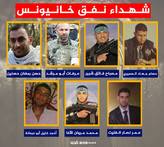
At least 7 Palestinians were killed and 11 others were injured, some of whom critically, after the Israeli army blew up a resistance tunnel to the east of Khan Younis in the southern Gaza Strip, according to the spokesman of Gaza's Ministry of Health, Ashraf al-Qedra.
The PIC reporter said that two members of the Qassam Brigades, the armed wing of Hamas Movement, were killed while trying to rescue the Quds Brigades militants stuck in the bombed tunnel.
Al-Quds Brigades, the armed wing of the Islamic Jihad Movement, announced that Arafat Abu Murshid, the Brigades' commander in central Gaza, was killed along with his associate and other militants.
Search operations for other casualties in the destroyed tunnel are ongoing and the number of martyrs is likely to increase.
Al-Quds Brigades announced a state of alert in the besieged Gaza Strip and affirmed that they are considering all options including the option of responding to this attack.
A wave of anger prevailed among the Palestinian citizens in Gaza who gathered in the hospitals in protest at the Israeli crime.
Earlier on Monday, the Israeli occupation army claimed responsibility for the strike that targeted the tunnel stretching between the Gaza Strip city of Khan Younis and the 1948 occupied Palestinian territories.
Spokesman for the Israeli army said that the Israeli southern command destroyed a Palestinian tunnel under construction using new technology after it was discovered near the border fence east of Kahn Younis.
In a later development, an Israeli military spokesman told Yedioth Ahronoth newspaper that Iron Dome missile defense systems were deployed in the areas bordering the Gaza Strip in anticipation of any response to the attack.
The PIC reporter said that two members of the Qassam Brigades, the armed wing of Hamas Movement, were killed while trying to rescue the Quds Brigades militants stuck in the bombed tunnel.
Al-Quds Brigades, the armed wing of the Islamic Jihad Movement, announced that Arafat Abu Murshid, the Brigades' commander in central Gaza, was killed along with his associate and other militants.
Search operations for other casualties in the destroyed tunnel are ongoing and the number of martyrs is likely to increase.
Al-Quds Brigades announced a state of alert in the besieged Gaza Strip and affirmed that they are considering all options including the option of responding to this attack.
A wave of anger prevailed among the Palestinian citizens in Gaza who gathered in the hospitals in protest at the Israeli crime.
Earlier on Monday, the Israeli occupation army claimed responsibility for the strike that targeted the tunnel stretching between the Gaza Strip city of Khan Younis and the 1948 occupied Palestinian territories.
Spokesman for the Israeli army said that the Israeli southern command destroyed a Palestinian tunnel under construction using new technology after it was discovered near the border fence east of Kahn Younis.
In a later development, an Israeli military spokesman told Yedioth Ahronoth newspaper that Iron Dome missile defense systems were deployed in the areas bordering the Gaza Strip in anticipation of any response to the attack.
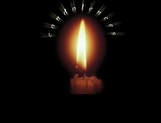
Ahmed Abu Armana 25
The Israeli occupation army on Monday struck a Palestinian resistance site east of Khan Younis, south of the besieged Gaza Strip, leaving at least one Palestinian killed and nine others injured.
The casualties were rushed to Shuhadaa al-Aqsa Hospital, in Gaza, so as to be treated for the injuries sustained in the attack, according to the Palestinian Health Ministry. One Palestinian was pronounced dead shortly afterwards.
The victim was identified as 25-year-old Ahmed Abu Armana.
Sometime earlier, the Israeli army claimed responsibility for an attack targeting a Palestinian resistance site under construction on the borderland between 1948 Occupied Palestine and Khan Younis.
The occupation army added that the blast was carried out using new “breakthrough technology.”
Sounds of heavy blasts were detected along Gaza’s border fence.
The Israeli occupation army on Monday struck a Palestinian resistance site east of Khan Younis, south of the besieged Gaza Strip, leaving at least one Palestinian killed and nine others injured.
The casualties were rushed to Shuhadaa al-Aqsa Hospital, in Gaza, so as to be treated for the injuries sustained in the attack, according to the Palestinian Health Ministry. One Palestinian was pronounced dead shortly afterwards.
The victim was identified as 25-year-old Ahmed Abu Armana.
Sometime earlier, the Israeli army claimed responsibility for an attack targeting a Palestinian resistance site under construction on the borderland between 1948 Occupied Palestine and Khan Younis.
The occupation army added that the blast was carried out using new “breakthrough technology.”
Sounds of heavy blasts were detected along Gaza’s border fence.

The Israeli occupation army called up Monday the reverse soldiers to carry out a large-scale military training, 0404 Hebrew website reported.
The sources did not reveal further details about the planned training. However; the spokesman for Israeli occupation army said that the exercises come as part of 2017 military training agenda.
Meanwhile, large military drills are currently carried out in Eilat south of occupied Palestine.
The sources did not reveal further details about the planned training. However; the spokesman for Israeli occupation army said that the exercises come as part of 2017 military training agenda.
Meanwhile, large military drills are currently carried out in Eilat south of occupied Palestine.
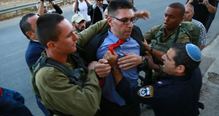
Israeli Occupation Forces (IOF) along with Jewish settlers assaulted a UK solidarity delegation who came on foot from Britain to occupied Palestinian territories in order to mark the 100th anniversary of Balfour Declaration on November 02.
IOF soldiers banned foreign solidarity activists from accessing al-Shuhada Street and other closed areas.
The UK delegation consisted of 60 activists who walked from the UK to Occupied Jerusalem in a journey that lasted for 135 days. The delegation was received by al-Khalil organizations which offered the delegation a tour in the city.
The settlers also assaulted al-Khalil Assistant Governor Nidal al-Jaabari. Meanwhile, IOF troops detained al-Khalil Governor Consultant Mahdi Mereb for a few hours upon the request of settlers who ousted the local and foreign activists.
IOF soldiers banned foreign solidarity activists from accessing al-Shuhada Street and other closed areas.
The UK delegation consisted of 60 activists who walked from the UK to Occupied Jerusalem in a journey that lasted for 135 days. The delegation was received by al-Khalil organizations which offered the delegation a tour in the city.
The settlers also assaulted al-Khalil Assistant Governor Nidal al-Jaabari. Meanwhile, IOF troops detained al-Khalil Governor Consultant Mahdi Mereb for a few hours upon the request of settlers who ousted the local and foreign activists.
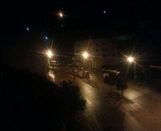
Israeli soldiers and undercover offices invaded, earlier Monday, the northern West Bank city of Jenin, and Jenin refugee camp, shot and injured a Palestinian driver, and abducted two young men from their homes.
The head of the Emergency Department of the Red Crescent in Jenin, Mahmoud Sa’adi, said the undercover Israeli soldiers opened fire at a Palestinian, who was driving a garbage collection truck, and wounded him in the leg, in addition to causing damage to the vehicle.
He added that Red Crescent medics rushed to the scene, and provided the wounded man with the urgently needed treatment, before moving him to a hospital in Jenin.
Furthermore, many soldiers invaded Jenin refugee camp, before breaking into and searching many homes, and abducted two young men, identified as Yousef Abu as-Seba’ and Ahmad Fadel Qassem, in their twenties.
Many Palestinians protested the invasion, and the abductions, while the military fired many live rounds and rubber-coated steel bullets.
On Sunday evening, soldiers and police officers invaded the al-’Isawiya town, in the center of occupied Jerusalem, and photographed several homes and buildings, an act which precedes the issuing of demolition orders.
The head of the Emergency Department of the Red Crescent in Jenin, Mahmoud Sa’adi, said the undercover Israeli soldiers opened fire at a Palestinian, who was driving a garbage collection truck, and wounded him in the leg, in addition to causing damage to the vehicle.
He added that Red Crescent medics rushed to the scene, and provided the wounded man with the urgently needed treatment, before moving him to a hospital in Jenin.
Furthermore, many soldiers invaded Jenin refugee camp, before breaking into and searching many homes, and abducted two young men, identified as Yousef Abu as-Seba’ and Ahmad Fadel Qassem, in their twenties.
Many Palestinians protested the invasion, and the abductions, while the military fired many live rounds and rubber-coated steel bullets.
On Sunday evening, soldiers and police officers invaded the al-’Isawiya town, in the center of occupied Jerusalem, and photographed several homes and buildings, an act which precedes the issuing of demolition orders.
29 oct 2017

A group of Israeli settlers, escorted by the Israeli occupation forces (IOF), on Sunday attacked a number of Palestinian farmers and foreign peace activists who were picking olives near the city of Nablus.
The Palestinian activist Myassar Atiani told Quds Press that the settlers coming from the nearby Eli settlement and the IOF soldiers assaulted the olive pickers and confiscated the IDs of the Palestinian farmers and the passports of the foreign activists.
Atiani pointed out that the IOF soldiers, after examining the confiscated documents, informed the foreign activists that they are not allowed to enter the area again; however, the activists rejected the decision saying that they will continue to help and support the Palestinian farmers.
A similar attack was recorded in the same area on Saturday in which a number of Palestinian farmers and foreign peace activists were injured.
According to anti-settlement activists, Palestinian farmers yearly suffer heavy losses because of the settlers' attacks which are usually escalated during the annual olive harvest season to force the farmers to leave their lands so that they become an easy target for settlement projects.
The West Bank and Gaza Strip have nearly 8.5 million olive trees, according to the Palestinian Ministry of Agriculture which said that the sales of olive crops and olive oil constitute 1% of the national income.
The Palestinian activist Myassar Atiani told Quds Press that the settlers coming from the nearby Eli settlement and the IOF soldiers assaulted the olive pickers and confiscated the IDs of the Palestinian farmers and the passports of the foreign activists.
Atiani pointed out that the IOF soldiers, after examining the confiscated documents, informed the foreign activists that they are not allowed to enter the area again; however, the activists rejected the decision saying that they will continue to help and support the Palestinian farmers.
A similar attack was recorded in the same area on Saturday in which a number of Palestinian farmers and foreign peace activists were injured.
According to anti-settlement activists, Palestinian farmers yearly suffer heavy losses because of the settlers' attacks which are usually escalated during the annual olive harvest season to force the farmers to leave their lands so that they become an easy target for settlement projects.
The West Bank and Gaza Strip have nearly 8.5 million olive trees, according to the Palestinian Ministry of Agriculture which said that the sales of olive crops and olive oil constitute 1% of the national income.

Yedioth Ahronoth newspaper on Sunday reported that Israel's war minister, Avigdor Lieberman, is seeking to expand the scope of sanctions imposed on the Palestinians involved in anti-Israel attacks.
The paper explained that Lieberman wants to examine the possibility to expand the demolition policy targeting the homes of the Palestinians who carry out fatal attacks to include the homes of those who carry out attacks in which Israelis are injured.
According to the Hebrew newspaper, Lieberman said, "There is no difference between an attack that ends in murder and one that ends in a serious injury," adding, "Homes of terrorists must be destroyed in both cases."
The Israeli occupation forces have demolished dozens of Palestinian houses in the recent months as part of a punitive policy pursued against the Palestinians involved in attacks that lead to killing or injuring Israeli settlers or soldiers.
The paper explained that Lieberman wants to examine the possibility to expand the demolition policy targeting the homes of the Palestinians who carry out fatal attacks to include the homes of those who carry out attacks in which Israelis are injured.
According to the Hebrew newspaper, Lieberman said, "There is no difference between an attack that ends in murder and one that ends in a serious injury," adding, "Homes of terrorists must be destroyed in both cases."
The Israeli occupation forces have demolished dozens of Palestinian houses in the recent months as part of a punitive policy pursued against the Palestinians involved in attacks that lead to killing or injuring Israeli settlers or soldiers.
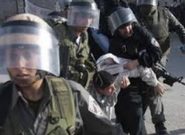
Dozens of Israeli soldiers invaded, on Sunday at dawn, several neighborhoods in Hebron’s Old City, in the southern part of the occupied West Bank, and Beit Ummar town, north of Hebron, abducted two children, and repeatedly assaulted a man after briefly detaining him.
The soldiers invaded Beit Ummar town, before breaking into and violently searching several homes, and abducted two children, identified as Qussai Samir Abu Mariya, 15, and Qussai Ahmad Abu Hashem, 17.
The abduction of the two children brings the number of Palestinians, who were taken prisoner by the army in Beit Ummar since the beginning of this year, to 148, including 78 children.
In addition, the soldiers invaded many neighborhoods in Hebron’s Old City, briefly detained Yosri Adnan Zeitoun, and repeatedly kicked and clubbed him before releasing him.
The man was instantly moved to Hebron governmental hospital, suffering various cuts and bruises.
The soldiers also installed many roadblocks in southern Hebron, and on roads leading to surrounding villages and towns.
The soldiers invaded Beit Ummar town, before breaking into and violently searching several homes, and abducted two children, identified as Qussai Samir Abu Mariya, 15, and Qussai Ahmad Abu Hashem, 17.
The abduction of the two children brings the number of Palestinians, who were taken prisoner by the army in Beit Ummar since the beginning of this year, to 148, including 78 children.
In addition, the soldiers invaded many neighborhoods in Hebron’s Old City, briefly detained Yosri Adnan Zeitoun, and repeatedly kicked and clubbed him before releasing him.
The man was instantly moved to Hebron governmental hospital, suffering various cuts and bruises.
The soldiers also installed many roadblocks in southern Hebron, and on roads leading to surrounding villages and towns.
